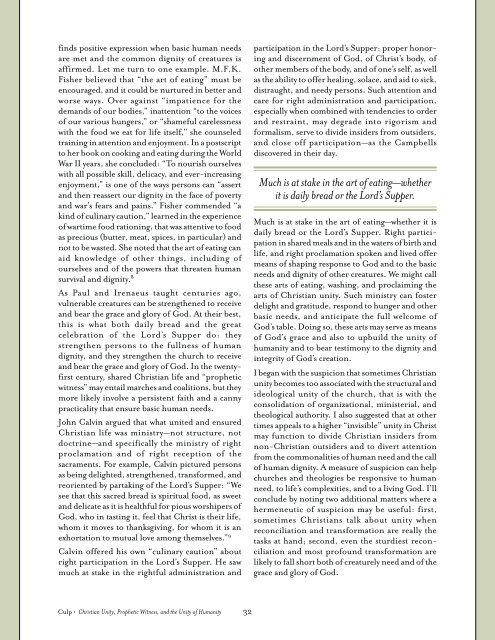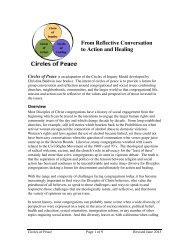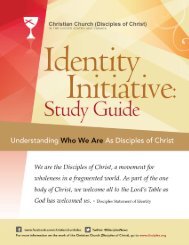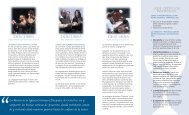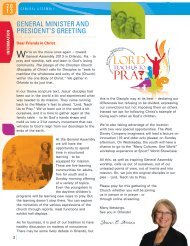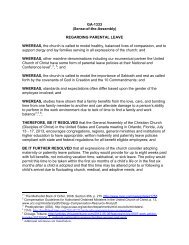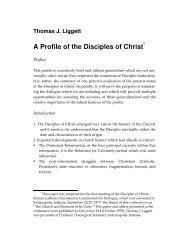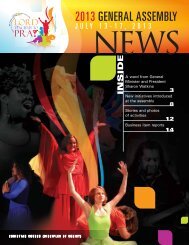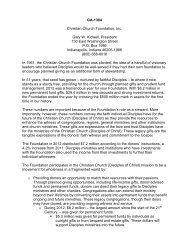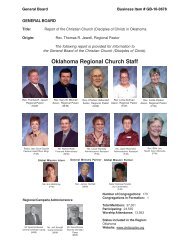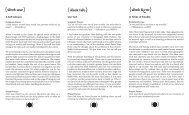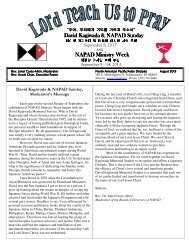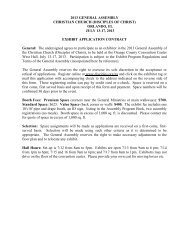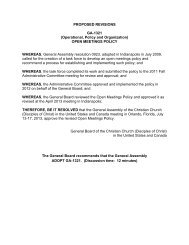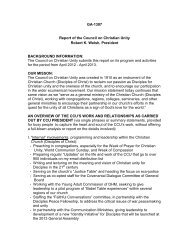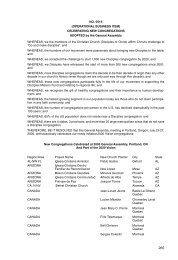RESOURCING THE CHURCH FOR ECUMENICAL MINISTRy A ...
RESOURCING THE CHURCH FOR ECUMENICAL MINISTRy A ...
RESOURCING THE CHURCH FOR ECUMENICAL MINISTRy A ...
You also want an ePaper? Increase the reach of your titles
YUMPU automatically turns print PDFs into web optimized ePapers that Google loves.
finds positive expression when basic human needs<br />
are met and the common dignity of creatures is<br />
affirmed. Let me turn to one example. M.F.K.<br />
Fisher believed that “the art of eating” must be<br />
encouraged, and it could be nurtured in better and<br />
worse ways. Over against “impatience for the<br />
demands of our bodies,” inattention “to the voices<br />
of our various hungers,” or “shameful carelessness<br />
with the food we eat for life itself,” she counseled<br />
training in attention and enjoyment. In a postscript<br />
to her book on cooking and eating during the World<br />
War II years, she concluded: “To nourish ourselves<br />
with all possible skill, delicacy, and ever-increasing<br />
enjoyment,” is one of the ways persons can “assert<br />
and then reassert our dignity in the face of poverty<br />
and war’s fears and pains.” Fisher commended “a<br />
kind of culinary caution,” learned in the experience<br />
of wartime food rationing, that was attentive to food<br />
as precious (butter, meat, spices, in particular) and<br />
not to be wasted. She noted that the art of eating can<br />
aid knowledge of other things, including of<br />
ourselves and of the powers that threaten human<br />
survival and dignity. 8<br />
As Paul and Irenaeus taught centuries ago,<br />
vulnerable creatures can be strengthened to receive<br />
and bear the grace and glory of God. At their best,<br />
this is what both daily bread and the great<br />
celebration of the Lord’s Supper do: they<br />
strengthen persons to the fullness of human<br />
dignity, and they strengthen the church to receive<br />
and bear the grace and glory of God. In the twentyfirst<br />
century, shared Christian life and “prophetic<br />
witness” may entail marches and coalitions, but they<br />
more likely involve a persistent faith and a canny<br />
practicality that ensure basic human needs.<br />
John Calvin argued that what united and ensured<br />
Christian life was ministry—not structure, not<br />
doctrine—and specifically the ministry of right<br />
proclamation and of right reception of the<br />
sacraments. For example, Calvin pictured persons<br />
as being delighted, strengthened, transformed, and<br />
reoriented by partaking of the Lord’s Supper: “We<br />
see that this sacred bread is spiritual food, as sweet<br />
and delicate as it is healthful for pious worshipers of<br />
God, who in tasting it, feel that Christ is their life,<br />
whom it moves to thanksgiving, for whom it is an<br />
exhortation to mutual love among themselves.” 9<br />
Calvin offered his own “culinary caution” about<br />
right participation in the Lord’s Supper. He saw<br />
much at stake in the rightful administration and<br />
Culp • Christian Unity, Prophetic Witness, and the Unity of Humanity<br />
32<br />
participation in the Lord’s Supper: proper honoring<br />
and discernment of God, of Christ’s body, of<br />
other members of the body, and of one’s self, as well<br />
as the ability to offer healing, solace, and aid to sick,<br />
distraught, and needy persons. Such attention and<br />
care for right administration and participation,<br />
especially when combined with tendencies to order<br />
and restraint, may degrade into rigorism and<br />
formalism, serve to divide insiders from outsiders,<br />
and close off participation—as the Campbells<br />
discovered in their day.<br />
Much is at stake in the art of eating—whether<br />
it is daily bread or the Lord’s Supper.<br />
Much is at stake in the art of eating—whether it is<br />
daily bread or the Lord’s Supper. Right participation<br />
in shared meals and in the waters of birth and<br />
life, and right proclamation spoken and lived offer<br />
means of shaping response to God and to the basic<br />
needs and dignity of other creatures. We might call<br />
these arts of eating, washing, and proclaiming the<br />
arts of Christian unity. Such ministry can foster<br />
delight and gratitude, respond to hunger and other<br />
basic needs, and anticipate the full welcome of<br />
God’s table. Doing so, these arts may serve as means<br />
of God’s grace and also to upbuild the unity of<br />
humanity and to bear testimony to the dignity and<br />
integrity of God’s creation.<br />
I began with the suspicion that sometimes Christian<br />
unity becomes too associated with the structural and<br />
ideological unity of the church, that is with the<br />
consolidation of organizational, ministerial, and<br />
theological authority. I also suggested that at other<br />
times appeals to a higher “invisible” unity in Christ<br />
may function to divide Christian insiders from<br />
non-Christian outsiders and to divert attention<br />
from the commonalities of human need and the call<br />
of human dignity. A measure of suspicion can help<br />
churches and theologies be responsive to human<br />
need, to life’s complexities, and to a living God. I’ll<br />
conclude by noting two additional matters where a<br />
hermeneutic of suspicion may be useful: first,<br />
sometimes Christians talk about unity when<br />
reconciliation and transformation are really the<br />
tasks at hand; second, even the sturdiest reconciliation<br />
and most profound transformation are<br />
likely to fall short both of creaturely need and of the<br />
grace and glory of God.


